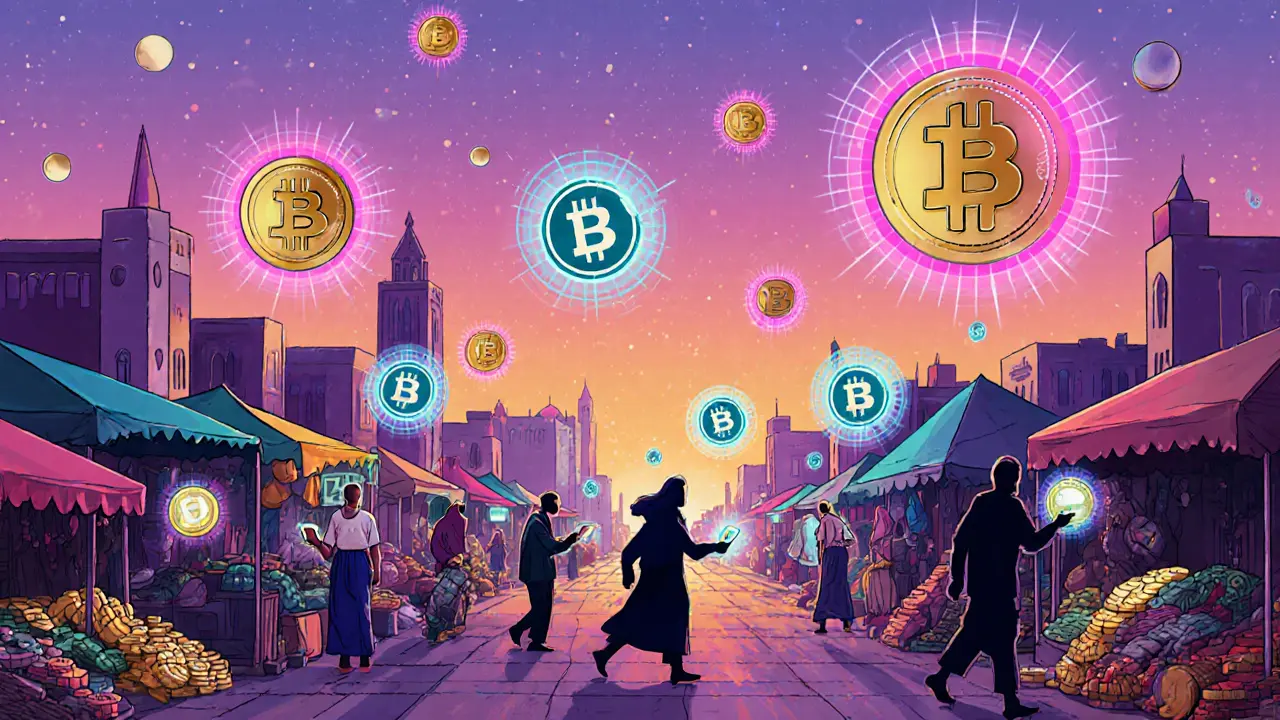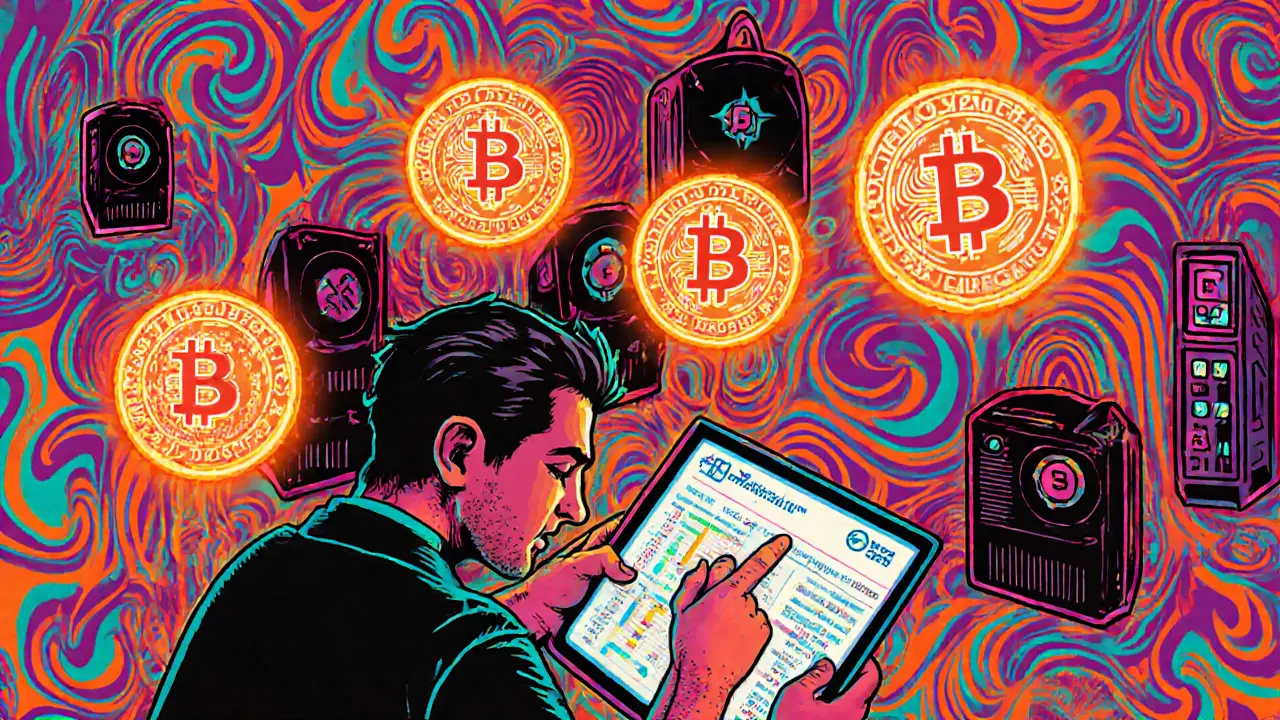Back in 2017, Morocco shut down all cryptocurrency activity overnight. No trading. No mining. No transfers. The reason? Foreign exchange violations. The central bank, Bank Al-Maghrib, saw crypto as a threat to the country’s control over its currency and capital flows. For years, anyone caught using Bitcoin or Ethereum could face heavy fines-or worse. But things changed in 2025.
From Total Ban to Controlled Legalization
Morocco didn’t just lift its ban. It rebuilt the rules from scratch. In early 2025, after years of study and international consultation, the government passed its first official cryptocurrency law. It’s not a free-for-all. It’s a tightly controlled system designed to stop money laundering, protect consumers, and-most importantly-keep foreign exchange under tight supervision. Now, you can legally trade crypto in Morocco… but only through platforms licensed by Bank Al-Maghrib. That means no more random apps or overseas exchanges. If a platform isn’t on the official list, it’s still illegal. And if you use one anyway? You’re breaking foreign exchange laws.What’s Still Illegal?
Even with the new law, three big things remain banned:- Crypto mining-still completely illegal. The government fears the electricity costs, the hardware imports, and the hidden dollar outflows. Mining rigs running in basements across Casablanca? That’s a violation waiting to happen.
- Using crypto to pay for goods or services-businesses can’t accept Bitcoin for products, even if the customer wants to pay that way. All commercial payments must go through traditional banking channels.
- Cross-border crypto transfers-sending crypto to someone in another country? That’s treated like an unapproved foreign exchange transaction. Even if you’re just helping a family member abroad, it’s risky.
These restrictions aren’t just about control. They’re about survival. Morocco’s economy relies heavily on remittances, tourism, and exports. If people start using crypto to bypass the official banking system, it could destabilize the Moroccan dirham. That’s why the government won’t budge on these points.
Penalties for Violations
The fines for breaking these rules are steep-and they’re being enforced.- Individuals caught trading on unlicensed platforms face fines between MAD 20,000 and MAD 100,000 (roughly $2,000-$10,000 USD).
- Businesses or crypto platforms operating without a license can be fined up to MAD 500,000 ($50,000 USD).
- Repeat offenders? That’s not just a fine anymore. It’s a criminal case under Morocco’s financial crime laws.
Authorities aren’t just going after big operators. They’ve started tracking peer-to-peer (P2P) trades using bank transaction data. If you’re buying Bitcoin from someone on Telegram and paying in cash or through a bank transfer, that leaves a trail. And the government is watching.

What’s Allowed-and How to Stay Legal
If you want to trade crypto in Morocco, here’s your checklist:- Use only a platform licensed by Bank Al-Maghrib. Check their official website for the current list.
- Complete full Know Your Customer (KYC) verification. No anonymous accounts.
- Report all crypto profits. The government taxes capital gains at 15%. Failure to report = tax evasion.
- Never use crypto to pay for anything. Stick to dirhams for purchases.
- Don’t mine. Don’t buy mining equipment. Don’t even think about setting up a rig.
Some people still use OTC traders or crypto ATMs in Marrakech or Rabat. But those are gray zones. The law doesn’t recognize them. If you’re caught, you won’t get a warning-you’ll get a fine.
How This Compares to the Rest of the Region
Morocco isn’t alone in being cautious. Egypt and Algeria have similar restrictions. But countries like Nigeria and South Africa have taken a different path-allowing crypto trading with fewer controls. Meanwhile, places like Canada and Kazakhstan are attracting Moroccan miners because they offer legal clarity and cheap power.Morocco’s strategy is unique: don’t ban crypto entirely, but make sure it can’t touch the foreign exchange system. It’s a middle ground-neither fully open nor fully closed. And it’s working. The market, once driven underground, is now growing openly. Projections show the Moroccan crypto market hitting $280 million USD in 2025, up from almost nothing just five years ago.
The e-Dirham: Morocco’s Own Digital Currency
Behind the scenes, Bank Al-Maghrib isn’t just regulating crypto-it’s building its own alternative. The e-Dirham, a central bank digital currency (CBDC), is in its second pilot phase. It’s being tested with Egypt and the World Bank for cross-border payments.This is the real endgame. If the e-Dirham works, it could replace the need for private cryptocurrencies altogether. Why use Bitcoin to send money to family in Spain when you can send an e-Dirham instantly, with full traceability and no foreign exchange risk?
For now, the e-Dirham is only for banks and government transactions. But in a few years, it could become the standard. That’s why Morocco’s government is so careful with crypto-it’s not trying to crush innovation. It’s trying to control it before it controls them.

What Happens If You Get Caught?
Let’s say you bought $5,000 worth of Ethereum in 2024 on Binance and sold it in 2025 for $7,000. You didn’t report it. You didn’t use a licensed platform. You didn’t pay tax. You’re now at risk. Bank Al-Maghrib works with the tax authority and the financial intelligence unit. They can trace your bank transfers. They can subpoena exchange records. If they find you, you’ll get a notice. You’ll have 30 days to pay the fine and back taxes. If you ignore it? Your bank account could be frozen. Your passport could be flagged. You could be barred from international travel.It’s not common-but it’s happening more often in 2025. The government has ramped up monitoring. The days of slipping under the radar are over.
What’s Next for Crypto in Morocco?
The next five years will decide whether Morocco becomes a regional fintech leader or stays stuck in regulatory limbo.- If the e-Dirham succeeds, private crypto could fade into irrelevance.
- If the licensed platforms prove secure and popular, the government might allow more flexibility-like crypto-based remittances.
- If enforcement fails and underground trading explodes, the ban could return-this time with even harsher penalties.
For now, the message is clear: you can trade crypto in Morocco-but only on their terms. Any attempt to bypass the system? That’s not innovation. That’s a foreign exchange violation.
Is it legal to buy Bitcoin in Morocco in 2025?
Yes-but only through platforms licensed by Bank Al-Maghrib. Buying Bitcoin on Binance, Coinbase, or any unapproved exchange is still illegal. You must use a locally approved platform and complete full KYC verification.
Can I use crypto to pay for things in Morocco?
No. Using cryptocurrency to pay for goods or services is strictly prohibited. All commercial transactions must go through traditional banking channels. Even if a shop accepts Bitcoin, it’s still a violation of foreign exchange rules.
What happens if I mine Bitcoin in Morocco?
Mining Bitcoin or any cryptocurrency is completely illegal in Morocco. The government bans it because it involves importing hardware, using electricity, and potentially moving money out of the country-all outside regulated channels. Violators face fines and possible criminal charges.
Are there taxes on crypto profits in Morocco?
Yes. Capital gains from cryptocurrency trading are taxed at 15%. You must report all profits to the tax authorities. Failing to do so is considered tax evasion and can lead to fines, penalties, or criminal prosecution.
Can I send crypto to someone in another country from Morocco?
No. Sending cryptocurrency across borders is treated as an unauthorized foreign exchange transaction. Even if you’re sending money to family, it violates Morocco’s currency control laws. Use official remittance services instead.
What’s the difference between the e-Dirham and Bitcoin?
The e-Dirham is Morocco’s own central bank digital currency, fully controlled by the government. Bitcoin is a decentralized, private cryptocurrency. The e-Dirham is traceable, regulated, and designed to replace cash and reduce reliance on foreign systems. Bitcoin, by contrast, operates outside the state’s control-which is why Morocco allows the e-Dirham but restricts Bitcoin.
Can I open a crypto account with a Moroccan bank?
No. Moroccan banks are not allowed to offer direct crypto accounts. You must use a licensed crypto platform approved by Bank Al-Maghrib. Your bank account can be used to deposit or withdraw fiat currency to fund your trades, but not to hold crypto directly.
Is it safe to use P2P crypto platforms in Morocco?
No. Peer-to-peer trading platforms are not licensed and operate in a legal gray zone. While many Moroccans still use them, they carry high risk. If authorities trace your transactions, you can be fined or prosecuted-even if you’re just buying crypto for personal use.
Bottom Line
Morocco’s crypto rules aren’t about stopping technology. They’re about protecting the economy. The government doesn’t want people to lose money on volatile assets. It doesn’t want capital to flee the country. It doesn’t want criminals hiding money in anonymous wallets.So yes, you can trade crypto-but only if you play by their rules. No mining. No payments. No cross-border transfers. No unlicensed platforms. And always, always report your gains.
Ignore the rules, and you’re not just risking money-you’re risking your freedom to move, to bank, to travel. In Morocco, foreign exchange control isn’t outdated. It’s the foundation. And crypto? It’s just a guest. And guests don’t get to rewrite the house rules.

Write a comment